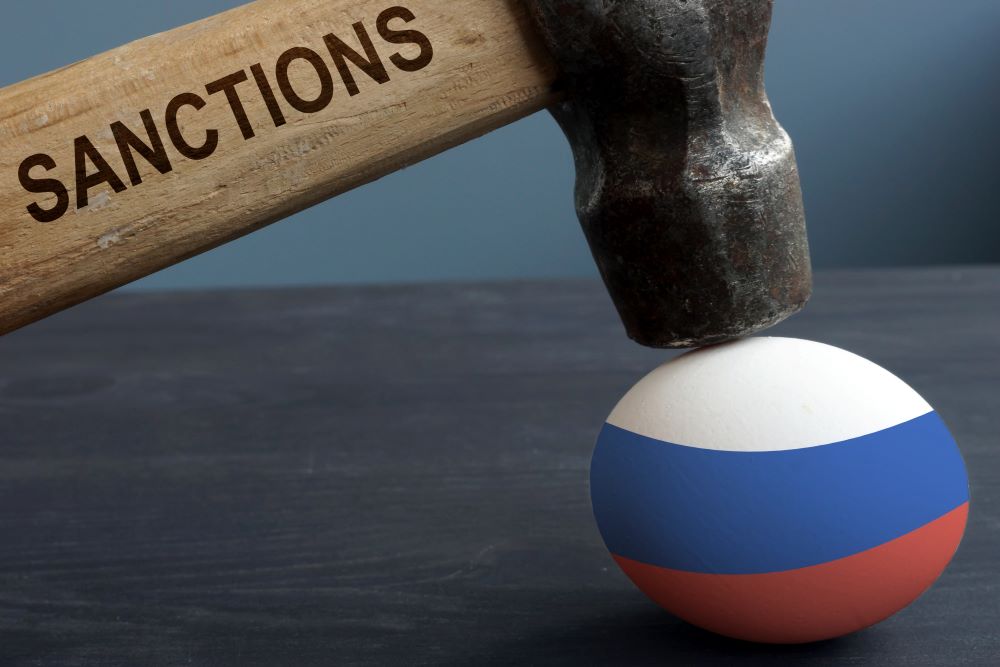
The Russian economy has started to “crater” under the pressure of international sanctions, according to US President Joe Biden.
Announcing US bans on Russian oil and gas imports, Biden said that the rouble was “now worth less than one American penny” and was down by 50% since Putin announced his war.
Biden’s statement underlined the extent of global sanctions, which were further demonstrated by Fitch’s decision last night to cut Russia’s sovereign rating, indicating a bond default was now “imminent”, Reuters reports.
Junk
Fitch downgraded Russia by six notches further into the junk territory to C from B.
“Further ratcheting up of sanctions and proposals that could limit trade in energy and increase probability of a policy response by Russia that includes at least selective non-payment of its sovereign debt obligations,” Fitch said.
Oil makes up 44% of all Russian exports and 17% of federal government revenue through taxation.
Moscow markets
Russia’s stock market will remain closed today, although its currency market will open, the Wall Street Journal reports .
The Moscow Exchange’s stock trading has been shut since 25 February and a strong sell-off is expected when it reopens.
Stocks of many Russian companies traded in London and New York fell to pennies a share before trading was suspended.
Oil prices
Global share markets fell on Tuesday as oil prices climbed yet further following the US announcement, reports Reuters.
Brent crude for May rose to an intra-day high of $131.27 a barrel before settling at $127.98 a barrel, representing a 3.9% increase. US crude futures settled at $123.70 a barrel, a 3.6% increase.
Russia has said this week that prices could surge to $300 a barrel and it could close the main gas pipeline to Germany if the West blocked its oil exports.
Equity
The MSCI world equity index, which tracks shares in 50 countries, fell by 0.8% yesterday.
The Dow Jones Industrial Average fell 184.74 points, or 0.56%, the S&P 500 lost 30.39 points, or 0.72% and the Nasdaq Composite dropped 35.41 points, or 0.28%.
Impact on UK
The BBC reports predictions of UK GDP growth being halved and disposable incomes seeing their biggest slide since 1955 due to the crisis.
In new research, the Centre for Business and Economic Research (CEBR) warned that a combination of rising commodity and oil prices alongside sanctions would result in GDP going down from a previous forecast of 4.2% to just 1.9%.
It expects inflation to hit 8.7% in the second quarter of this year and disposable incomes to fall by 4.8%, equivalent to £2,553 per household.
Diesel
Although the UK only get 8% of its oil from Russia, 18% of its diesel comes from there.
As well as higher prices at the pump, the diesel increase will feed through into the cost of the delivery of goods and onto consumers, RAC fuel spokesman Simon Williams said.
Price cap
Analysts expect the UK’s energy price cap - which limits what consumers pay for gas and electricity - to rise to more than £3,000 a year for the average household when it is next reviewed in October.
“We are on the cusp of a prolonged period of high oil and gas prices, possibly lasting several years,” said Nathan Piper, an oil and gas analyst at Investec.
The FT reports Lord Adair Turner, chair of the Energy Transitions Commission, recommending that British motorists save petrol by limiting their driving speed to 55mph.
Shell
Shell is one of the latest oil companies to say it will divest from all Russian oil and gas.
It will immediately stop buying Russian crude on spot markets and not renew long-term contracts.
It also plans to shut service stations, aviation fuels and lubricants operations in Russia, and start a “phased withdrawal from Russian petroleum products, pipeline gas and [liquefied natural gas]”, reports Politico.
Other boycotts
Other companies suspending their Russian operations yesterday included McDonald’s, Starbucks, Coca-Cola and Pepsi, reports the Guardian.
The Standard reports that Mothercare and tobacco giant Imperial Brands became the latest businesses to quit Russia over the war in Ukraine.



